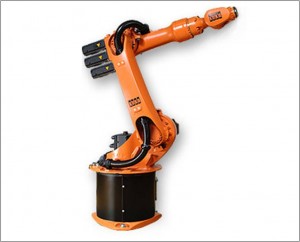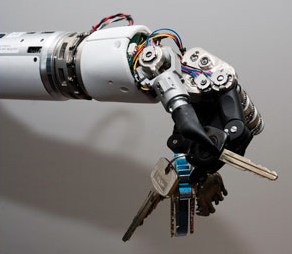or Mechatronic Engineering, humourously (but incorrectly) referred to as Megatronics at times. In Afrikaans Megatronika or Megatroniese Ingenieurswese. What is it? What can you do with it? When I started studying I didn’t know, after 5 years I think I have a vague idea. So below I’m going to post what I know.
In it’s simplest form it’s a combination of Mechanical and Electronic Engineering. If I really don’t feel like explaining, I simplify it to robotics. This is certainly a large portion of Mechatronics, but by no means a limiting factor.
Mechatronics as a named profession is fairly new, but the idea has always been there. In the South African context, UCT have had an accredited BSc (Eng) Mechatronics course since 1997 (although how long it has actually been running is uncertain), NMMU a BEng since 2007 (first graduates) and Stellenbosch since 2005 [1]. Potchefstroom University (NWU) are apparently aiming to start a course in the next few years [2]. Although not offered in the BEng format, UKZN do offer Masters through their Mechatronics and Robotic Research Group [3]. [EDIT: added list of BTech degrees and Diplomas offered at the bottom of the post]
Mechatronics at Stellenbosch [2]
I completed my BEng Mechatronics at Stellenbosch University in 2011. The Mechatronics course was presented by the Department of Mechanical and Mechatronic Engineering in a four year course. The first two years were identical to that of those studying towards a BEng Mechanical. The first year course is identical for all engineering students. In the third and fourth years, the two courses still followed similar routes, with the Mechatronics course replacing several Mechanical courses with some courses presented by the Department of Electronic and Electrical Engineering. In third year these included Electronics and Computer System’s courses and fourth year Electronics and Electronic Design Courses. Losing out on some Strength of Materials and Thermo-Fluid Mechanics.
The department put it this way [6]
The most important difference between the mechanical engineering programme and the mechatronic programme is that mechanical engineers are equipped to develop mechatronic systems with existing controllers (computers, PLC’s, etc.), while mechatronic engineers are also equipped to develop specialised controllers (e.g. for embedded controllers) and the relevant electronics themselves.
At the time, the Head of Department felt that Mechatronics as an entity was still too new. Employers weren’t advertising for Mechatronic Engineers, and didn’t really know what to do with them when they did get them. This resulted in the close ties between the Mechanical and Mechatronic courses. I was often unhappy about this, having would of preferred more focus on the Electronics, but in the end it worked out. And the HoD’s opinions were/are valid.
When I chose Mechatronics, I didn’t know where I was going to work, I chose the course because it sounded interesting. It wasn’t until my final year that I found a direction to work towards. Course setups at different universities are going to be different, and will put emphasis on different subjects, that doesn’t necessarily make one better than the other. Either way you’re going to come out of it with a degree and a fair amount of knowledge. Most importantly though (and this is true for any engineering degree) is you’ll know how to learn.
I’m quite confident that specific things that I learn in my first year of work will be of more value to my career than a specific subject at varsity, but having struggled through several subjects, I know I can figure out most things that come my way. I know where to look and how to go about solving problems.
In my final year we were a class of 85 Mechanical/Mechatronic students, of which I’d say about 30-35 received their BEng Mechatronics in 2011.
Mechatronics at NMMU [2]
NMMU have a slightly different setup. Mechatronics is presented by the Mechatronics school of the Department of Engineering, the Built Environment and IT. Mechatronics is the only Engineering degree they offer. As such, first year physics and maths are taken alongside BSc students and after the first year, courses taken are aimed only at Mechatronics students. The format of the course is still identical to that of when it started giving a good balance of subjects. The University also offers an array of BTech degrees in other Engineering fields.
I’m currently pursuing my master’s degree at NMMU. Their 4th year BEng Mechatronics class has roughly 25 students in it and the 3rd year class about 30. First year applications are limited to 60, with the most recent 1st year class starting with 50 students. The Mechatronics department is currently sponsored by General Motors South Africa (who have a plant in PE) and also have close ties to the Volkswagen plant in Uitenhage.
Mechatronics in General
Mechatronics as a career is still finding its feet. Meaning many consider it a jack of all trades, master of none type of situation, and although the course may feel that way, it’s certainly not the end of the story.
Mechatronics isn’t a new field, it’s just finally been given a name. When you tell people you’re a Mechatronic Engineer they don’t know what that is. I had a month stint at a large production facility as part of vacation training and I was asked to choose between focusing on their Mechanical or Electrical divisions, eventually settling for a bit of time at each. But that’s how businesses in SA are structured. This will change.
Several Mechatronic Engineers that I know have taken up Automation maintenance posts. Nothing wrong with this, personally it’s not where I want to be. Contrary to this though, my first job next year will be in automation maintenance. I however plan to use this as a stepping stone into a design career.
Automation is fun, and whereas I am going into automation in a production sense, automation also relates to smaller and/or more technical situations. The recent landing of the Curiosity rover on Mars is a perfect example of Mechatronic systems. There are several elements here, from the automated landing system to the remote control of the device.
In the motor industry, systems such as traction control, ABS and ESP are all examples of Mechatronic systems. Heavily complicated systems that rely on the processing of data from sensors to enable control of actuators. As such a Mechatronic Engineer can make him/herself home in many different industries. These include the Automotive, Aerospace, Manufacturing, Medical and Communications Industries.
Mechatronic Engineers can register with ECSA to become Professional Engineers [4]. The industry is governed by the South African Institute for Mechanical Engineers. I don’t see Mechatronics separating from this tree any time soon. The degree, being accredited by ECSA also means that the degree will be recognised internationally in many countries thanks to the Washington, Sydney and Dublin Accords [5]
So what do you do when you have your degree? You do whatever you want. You’ll find something. I’m not aware of any of my colleagues who are currently not pursuing a post-graduate degree or are employed. Not all of them are in Mechatronic specific posts. Some have opted for more mechanical orientated jobs, while others have gone entirely into areas such as electronic design or programming. And that’s one thing, a degree in Mechatronic Engineering in no way limits you. Very few engineering degrees will actually.
After re-reading what I’ve written, I think I’ve put forward some information relating to Mechatronic Engineering, but it’s still left fairly vague, maybe it’s just because none of us know what we’re really doing :)
A National Diploma in Mechatronics (for registration as a Professional Engineering Technician) can also be had from the following institutions [7]:
- Tshwane University of Technology
- UNISA
- Cape Peninsula University of Technology
A BTech in Mechatronics (for registration as a Professional Engineering Technologist) from [8]:
- Tshwane University of Technology
- UNISA
- Cape Peninsula University of Technology
and to reiterate, a BEng, or BScEng (for registration as a Professional Engineer) [1]:
- Stellenbosch University
- University of Cape Town
- Nelson Mandela Metropolitan University
Note: Although other institutions may offer courses in Mechatronics, or Mechanical Engineering with a focus on Mechatronic elements, the ones listed above are the only ones recognised by ECSA for registration as a mechatronic professional. Information was correct at time of posting, but may have changed since.
There are also several Universities of Technology and FET Colleges which offer courses in Mechatronics. CPUT is one of these institutions. Another training institution is Umbilo Training Specialists in Durban. They are running a free training course, once a month where anyone can come to learn more and expand their knowledge. Checkout their page for details.
For some more reading and a very complimentary view with some poignant remarks have a read here.
As part of my degree at Stellenbosch University I completed a project which can be seen here.
As part of my master’s degree at NMMU I completed a project which can be seen here and here.
If you’re looking for bursaries, try this website.
If you have any questions, feel free to ask in the comments section.
- [1] ECSA – Accredited Universities
- [2] Much of what is stated comes from my own experiences and conversations with relevant people.
- [3] UKZN – Mechatronics and Robotics
- [4] ECSA – Registration
- [5] ECSA – Recognised Qualifications
- [6] Stellenbosch University – Mechatronic Engineering
- [7] ECSA – Accredited Diplomas
- [8] ECSA – Accredited BTech





Hi Sir
Thanks for shining a light about how “cool” is mechatronics. I came across it in 2011, at some FET college. I thought it was just about robotics- I was wrong, It’s way more that that.
I completed my Mechatronics Nc(v) Level 4 in 2013 and I still purse it in university. The thing is, I qualify for a National Diploma at TUT……so my question is;
are there any good opportunities for mechatronic technicians? or do you think it is much better I acquire a degree.
Why i ask this is that many mechetronic “studies” mostly follow Mechanical related opportunities.
Regards
Andile
Hey Andile
It’s difficult to say. It depends what you want to do, and what you can achieve with what you have. I think you can get quite far with a diploma, but obviously some positions are going to require a degree. A Btech is also something that can be done part time should that appeal to you.
There are however opportunities for engineers at any level.
I wouldn’t say do/don’t study further, it’s up to you what you want to do.
Hi Andile,
If you ever come to Durban KZN come and visit us for our Free Introduction Course in Mechatronics.Our Mechatronics training is very different than what they offer at FET Colleges or by a lot of these Motor Manufactures. We will take your knowledge to another level (International) and equip you ‘Work Ready Skills”. We will increase your knowledge in Mechatronics by x 10 in just one day. If we do not accomplish that or you feel I have wasted your time for that day I will give you a Laptop.
Chris Milton
Mechatronics Technician
Good Day
I want to do mechatronics next year , but im not sure where i want to do it, which between NMMU and UCT would you recommend?
Thank you in advance
Hi Xolisani
I’m not in the business of recommending universities. Both will offer you a good degree, slight differences with regards to content as well as campus life.
Hi, I’m currently doing a BSc in computer science at NMMU but originally had intended to study mechatronics. Due to space constraints I couldn’t enroll for 2014 so I chose the closest thing in terms of modules to mechatronics(which was in computer science in my opinion) I applied for 2015 and I got in and I just wanted to say your blog post just grew my love for mechatronics and keep up the good work. Can’t wait for next year
Hey Nelson, always good to hear from a fellow enthusiast, Good luck!
Also, just to pick your brain, since some of the modules are the same between the two degree, would you advise me to apply for exemption from those modules or do you recon it’s a bad idea?
I’d definitely apply for exemption, especially for first year computer science and the maths and physics classes. Lets you focus more on other subjects, possibly look at doing a second year subject so long.
hi, i’m just about completing my higher diploma in mechanical engineering, but my passion is actually in mechatronics. I’ll be undergoing a 9 months practical programme in mechatronics after my diploma. Please, how can i get my masters in S.A, considering that i have a diploma and not a degree, and that i studied mechanical engrn but with just basic mechatronic knowledge. Thanks
Hi Anthony, you’ll most likely have to complete a BTech or other honours degree before being allowed to start a masters. You may also be able to get in with sufficient work experience. It’s best to contact universities or Professors in your preferred area to get exact details on requirements.
Hey Gareth
I’m currently starting my 12th grade this year and I really want to study mechatronics. Actually how many years do I have to study mechatronics? After studying mechatronics let me say one wants to start a company and what kind of companies can u have from knowledge of a mechatronic engineer? What’s the minimum salary of a mechatronic engineer?
A standard degree is 4 years, a diploma can be had for 3. And I don’t understand what you’re asking about companies, you’ll have to clarify. A minimum starting salary for an engineer with a degree currently is R 15 000 pm.
is it difficult to find a good paying job in mechatronics ??
What is the highest salary of a mechatronics engineer which you know of??
Can i get a list of companies that hire mechatronics engineer which you know of ??
Or can you tell me where i could find such a list if you know
No I wouldn’t say it is difficult, it just depends on what work you want to do.
I don’t know, it depends on the type of job.
I don’t think such a list exists, but you can get a job in many different industries.
Hi Gareth,
I am a Mechatronics Technician, I run a very low cost Mechatronics Course at our well equipped training facility in KZN Durban. This is ‘Hands On’ training and is assured to exceed anyones expectations, no matter what level they already accomplished. Trainees that attend our training courses range from Grade 12 to Mechatronics Engineers with Degrees or National Diplomas. Our training program is unigue to our centre and it will not be possible to get better value for your time anywhere else in the country. The program covers in detail, Industrial Electrical beyond Trade Test Level (Sensors, Motors, Switchgear, Temp. Controllers) / PLC Programming (Basic to Advanced, using our special method of design) / AC Drives (Parameter setting as well 40 different ways on how to wire it), / Pneumatics Systems (how to design and construct complicated systems). Every trainee is given a option of a full refund if we are unable to equip him with with these advanced technical skills. If you have anyone of your followers interested in a life changing experience get them to contact me for a Free Introduction course.
Regards
CC Milton
Mechatronics
Assessor/ Facilitator
082 540 8437
Hey CC, sounds like a great place. Do you have a website I can link to if people are looking for more information?
Hi Gareth,
Thanks for the opportunity but, regretfully at this point in time we do not have a Web page, although we are on Facebook under “Umbilo Training Specialists”. We could also be contacted by email on uts.tech@vodamail.co.za for more information.
I really appreciate your professional opinion and input when answering questions, my team and I have benefitted tremendously.
Thanks
Chris
Cool, will link to your Facebook page in the article. Pleasure.
is this course still available?
Nvm the companies. Where can I get mechatronics bursaries because most of the bursary form don’t include mechatronics?
with mechatronics, can u work in a company of robotics?
is there a PhD of mechatronics, if so, how many years do I have to study for it?
Few companies specify mechatronics on their application forms besides those in the automotive industry. However you should still be able to apply for mechanical or electronic bursaries in the correct industries even if you’re doing mechatronics.
You can do your phd in mechatronics. 4 years for a degree plus 2 years for a masters and another 3 years for a PhD.
since SUN focuses more mechanical stuff , UCT on electronic stuff and nmmu a little bit of both does this mean you get different job oppotunities?
what is the benefit of having a focus on electronics?
No. Businesses won’t discriminate between the different universities as this can change over time and is not necessarily a commonly understood fact.
Different focuses make it easier to do work in different areas.
Hey Gareth!
Thank you very much for this informative post which indeed gave me a better idea of Mechatronics. I have one doubt that I request you to clear. If I decide to study Electrical engineering at Bachelor’s level, will I then be able to pursue my postgraduate studies in Mechatronics?
Hoping to hear from you soon :)
Yes. Generally regardless of your undergrad degree you can do your masters in a different engineering discipline. It helps if you do a final year project in a field near to what you want to do your masters in.
Thanks a lot for your response.
I am actually in a dilemma of Electrical engineering and Mechatronics. Based on the current and future world trend, which course would you advice me to go for?
Sorry for taking your time :)
Hey armaan. No problem, I don’t think either choice is a bad one, both will have a future going forward. Look around and see what you think you’ll enjoy the most.